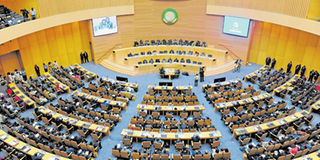Morocco readmission into AU leaves grouping split over Sahrawi imbroglio

African Union leaders attend a summit in Addis Ababa. PHOTO | FILE
What you need to know:
The decision was expected to be in favour of Morocco after King Mohammed VI toured several African countries to win their support for his country’s bid to re-join the continental body.
The African Union (AU) chose to re-admit Morocco back into the fold after it had quit its predecessor in 1984 protesting over the decision of recognising Western Sahara, a territory Morocco claims to be under its sovereignty.
The decision was expected to be in favour of Morocco after King Mohammed VI toured several African countries to win their support for his country’s bid to re-join the continental body.
President Macky Sally of Senegal told reporters that 39 countries voted in favour of readmitting Morocco, stressing the importance of all African countries being part of the continental body. Liberia’s Ellen Johnson-Sirleaf echoed her Senegalese counterpart. saying the decision was reached for the sake of “African Unity”.
However, unity is elusive in Addis Ababa. In July 2016, media reports showed that the AU was split on the status of Western Sahara, where 28 of the 54 member states at the time voted to expel it from the union; with the decision taken at the time Morocco announced its intent to rejoin the AU. There are many reasons which could explain Morocco’s decision to re-join the AU, as well as the decision of the AU to re-admit Morocco.
The AU is a cash-strapped institution, and has been heavily dependent on fickle Western financiers and lost one of its chief financiers in former Libya strongman Muammar Gaddafi, following the chaos of the Arab spring in 2011. Morocco is undoubtedly one of the richest countries on the continent and spent heavily on some of the AU’s influential countries and those with liberation background like Tanzania through trade deals and investments to smoothen its way back in the fold.
At the time when the AU is pushing a mass withdrawal of its members from the International Criminal Court (ICC), something seen as a step backward by Western powers, the AU will take all the help it can get to financially disentangle itself from the West. Despite the differences in opinions among AU member states with regard to ICC membership, the majority of these countries loathe what they consider as “interference” by Western powers through such International institutions in domestic matters.
On its part, back in August, King Mohammed VI while addressing his country on the People’s Revolution celebration day, he said Africa meant more to Morocco than just geographical location. He framed his country’s relationship with the rest of the continent in Pan-Africanism terms, and that he wanted Morocco to be at the centre of Africa’s development.
During his speech to fellow leaders after Morocco had been re-admitted to the AU, he told them that the “Kingdom has never left Africa”, with attention being paid to slightly over a thousand bilateral agreements Morocco has signed with other African countries stretching back to the 1960s.
On a different front, during its absence Morocco has realised that its interests and the future are to its South, as her other neighbours in the North across the strait witness a rise in alt-right influences in mainstream politics and the Middle East and the Arab world torn apart by the latest round of the upheavals which started in 2011. Looking South was natural.
Morocco realised that during the three decades it had boycotted the AU, it could not change its stance on Western Sahara, and if anything it hardened its resolve because it was considered to be not part of “the family”. However, Morocco is in a different position now to influence the fate of Western Sahara within the AU along with its hopes of political independence one day.
The re-admission of Morocco is testament to changed times as well.
The continent no has long adapted to the realities of a post-Cold war world where ideologies take backseat to geo-political and trade calculations. Realising the delicacy of its position, Western Sahara representatives to the AU voiced support for Morocco’s return with hope that this move will help resolve the differences between them and facilitate its independence.
That remains to be seen.
For now, the AU though proud of its past, it seems determined to confront what it perceives to be contemporary challenges even if that means it has to contradict that past. After all, even in that past, its member states never agreed on everything and at one time such differences came close to disintegrating the predecessor organisation.
As strange as it might sound, it is progress that the differences left the AU intact to fight another day to resolve it s contradictions.




